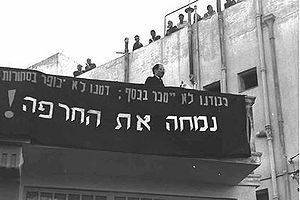
Wiedergutmachung
Encyclopedia

German language
German is a West Germanic language, related to and classified alongside English and Dutch. With an estimated 90 – 98 million native speakers, German is one of the world's major languages and is the most widely-spoken first language in the European Union....
word Wiedergutmachung after World War II
World War II
World War II, or the Second World War , was a global conflict lasting from 1939 to 1945, involving most of the world's nations—including all of the great powers—eventually forming two opposing military alliances: the Allies and the Axis...
refers to the reparation
Reparations Agreement between Israel and West Germany
The Reparations Agreement between Israel and West Germany was signed on September 10, 1952, and entered in force on March 27, 1953...
s that the German
Germany
Germany , officially the Federal Republic of Germany , is a federal parliamentary republic in Europe. The country consists of 16 states while the capital and largest city is Berlin. Germany covers an area of 357,021 km2 and has a largely temperate seasonal climate...
government agreed to pay to the direct survivors of the Holocaust, and to those who were made to work as forced labour or who otherwise became victims of the Nazis
National Socialist German Workers Party
The National Socialist German Workers' Party , commonly known in English as the Nazi Party, was a political party in Germany between 1920 and 1945. Its predecessor, the German Workers' Party , existed from 1919 to 1920...
.
The noun Wiedergutmachung is the general term for "restitution" or "reparation". The noun is made up of wieder ("again"), gut ("good" or "well"), and machung, a verbal noun
Verbal noun
In linguistics, the verbal noun turns a verb into a noun and corresponds to the infinitive in English language usage. In English the infinitive form of the verb is formed when preceded by to, e.g...
of machen ("to make"). The verb wiedergutmachen means literally "to make well again" or to compensate. Wiedergutmachungsgeld means "Wiedergutmachung money".
In the former East Germany, Wiedergutmachung was mostly directed to Poland and the former USSR.
The German federal office in charge of this issue is BEG (abbreviation for "Bundesentschädigungsgesetz", which translates into English
English language
English is a West Germanic language that arose in the Anglo-Saxon kingdoms of England and spread into what was to become south-east Scotland under the influence of the Anglian medieval kingdom of Northumbria...
as "Federal Compensation Law
German Restitution Laws
The German Restitution Laws were a series of laws passed in the 1950s in West Germany regulating the restitution of lost property and the payment of damages to victims of the Nazi persecutions....
") which, in its charter, states:
- Individuals who were persecuted for political, racial, religious or ideological reasons by the wartime German regime are eligible for money from the German government under the terms of the Federal Compensation Law (BEG) of 1953 and 1956. This includes Jews who were interned in camps or ghettoGhettoA ghetto is a section of a city predominantly occupied by a group who live there, especially because of social, economic, or legal issues.The term was originally used in Venice to describe the area where Jews were compelled to live. The term now refers to an overcrowded urban area often associated...
s, were obliged to wear the star badge, or who lived in hiding.
Only people who were directly victimised are eligible for Wiedergutmachung, and not, for example, offspring born after the war or grandchildren. Statistics concerning Wiedergutmachung payments were released by the BEG through the mid-1980s, but have not since been publicly released. As of the mid-1980s, over four million claims had been filed and paid. Approximately 40% of the claims were from Israel
Israel
The State of Israel is a parliamentary republic located in the Middle East, along the eastern shore of the Mediterranean Sea...
, where many Holocaust survivors live, 20% were from Germany, and 40% were from other countries.
An unusual compensation was to the Republic of Ireland
Republic of Ireland
Ireland , described as the Republic of Ireland , is a sovereign state in Europe occupying approximately five-sixths of the island of the same name. Its capital is Dublin. Ireland, which had a population of 4.58 million in 2011, is a constitutional republic governed as a parliamentary democracy,...
, a neutral country, for bombings in 1941
Bombing of Dublin in World War II
The first bombing of neutral Ireland during World War II took place on 26 August 1940, when the German Air Force dropped bombs at Campile, County Wexford killing three people. The first bombing of the city of Dublin occurred early on the morning of 2 January 1941 when German bombs were dropped...
.

